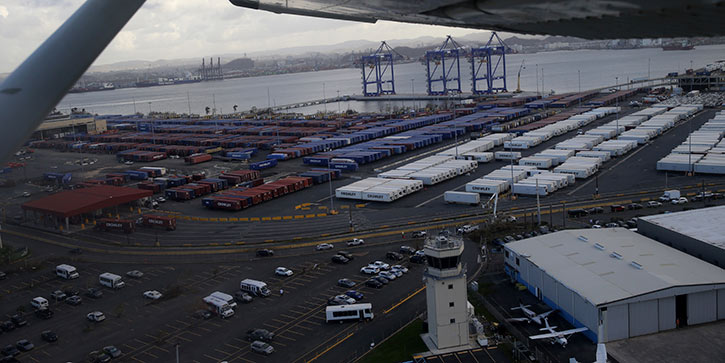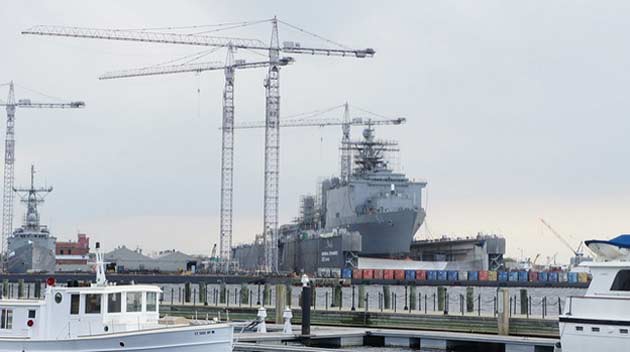
Taxing Puerto Rico to Save US Shippers
-
 Patrick Watson
Patrick Watson
- |
- October 3, 2017
- |
- Comments
In theory, capitalism is all about healthy competition, which makes producers deliver quality goods and services at lower prices.
Competition helps everyone, even producers. After all, if your competitors keep knocking you down, that means the market is suggesting you try something else.

Photo: Chris Hunkeler via Flickr
While most business leaders give lip service to the inherent fairness of free markets, in practice many try to avoid competition. Brilliant people devote entire careers to building innovative “moats” around themselves. The pharmaceutical industry, to name just one, is highly adept at it.
That’s all fine—until those businesses enlist the government to help them. Government exists to promote the common interest, not any particular company or industry.
All that comes to mind in the aftermath of Hurricane Maria. Among other things, the storm exposed a century-old law that needs us to take a good, hard look at it.
Bringing Home the Nautical Bacon
Wesley Jones was a US senator from the state of Washington from 1909 until his death in 1932, a few days after losing his reelection bid.
 Even back then, politicians worked hard to bring federal spending to their states. Jones, for example, helped the state of Washington acquire the Puget Sound Naval Shipyard.
Even back then, politicians worked hard to bring federal spending to their states. Jones, for example, helped the state of Washington acquire the Puget Sound Naval Shipyard.
Like what you're reading?
Get this free newsletter in your inbox regularly on Tuesdays! Read our privacy policy here.
But what he’s best known for is the Merchant Marine Act of 1920, now known as the Jones Act.
The Jones Act requires that shipments between two US seaports travel only on US-flagged vessels, built in US shipyards, with American owners and crews.
The reason was to ensure the US kept a viable commercial shipping industry in case of war. World War I had just ended, so this need was evident at the time. Moreover, the act helped Seattle-based shipping lines pick up Alaskan freight business.
Today, the Jones Act gives a few US companies a legally enforced monopoly on cargo between the mainland US and Alaska, Hawaii, Puerto Rico, and Guam.
A 2012 New York Fed study found it costs twice as much to ship a freight container from the US East Coast to Puerto Rico than to nearby Haiti. That’s what happens when there’s little or no competition—and it shows up in the higher prices Puerto Ricans pay for ordinary goods.
Too Much Candor
Sometimes the Jones Act gets waived, for instance, when the Trump administration let foreign-owned tankers deliver fuel to Florida ports after Hurricane Irma last month.
When Maria struck Puerto Rico soon after, people wondered why the island territory didn’t get the same favorable treatment. The Department of Homeland Security said it wasn’t necessary—thousands of containers were already clogging San Juan’s docks for lack of trucks, drivers, and passable roads.
Still, calls for a Jones Act waiver continued. The president himself finally commented last week. Here’s how news reports described it (with my emphasis added).
“On Puerto Rico, Mr. President, why not lift the Jones Act like you did in Texas and Florida?” a reporter asked as Trump made his way to Marine One.
“Well, we’re thinking about that,” he responded. “But we have a lot of shippers, and a lot of people—a lot of people that work in the shipping industry that don’t want the Jones Act lifted. And we have a lot of ships out there right now.”
That candid answer seemed to confirm the most cynical fears: that the shipping industry was protecting its bottom line rather than help suffering Americans in Puerto Rico.
Apparently realizing how bad this looked, the White House announced the next morning the Jones Act would be waived for 10 days.
Like what you're reading?
Get this free newsletter in your inbox regularly on Tuesdays! Read our privacy policy here.
A few hours later, Senators John McCain and Mike Lee introduced a bill to make that waiver permanent for Puerto Rico.
A 1936 Jones Act amendment exempted the US Virgin Islands, so McCain and Lee’s bill has precedent. If it passes, you can bet Alaska and Hawaii will demand equal treatment. And then the Jones Act will be no more.
Will it matter to anyone?
US shipping companies will be at a cost disadvantage because US labor laws won’t apply to any foreign competitors that start serving those routes. They’ll have to adapt.
On the other hand, autonomous car and truck technology might lead to autonomous ships too, or at least much smaller crews. Labor costs may be less important in the future.
Special Taxes
Jones Act advocates argue the US needs shipyards and experienced workers so it can expand the navy in wartime.
That makes sense, but the assumption that future wars will look like World War II is probably wrong. We’ll have Robbie the Robot, not Rosie the Riveter.

Photo: Vicky Vinch via Flickr
War or not, though, the US Navy, Coast Guard, and other government agencies will keep using American shipyards. That part of the industrial base won’t disappear.
(Disclosure: my co-editor Robert Ross and I have one such company in the Macro Growth & Income Alert model portfolio, and it’s performed well. Building ships for the US Navy is a profitable and growing business, and we don’t foresee that changing.)
On the other side of the equation, residents of Alaska, Hawaii, Puerto Rico, and Guam pay a special “tax” via higher prices every time they buy something from the continental US. It’s a direct transfer from their wallets to the US shipping and shipbuilding industry.
Like what you're reading?
Get this free newsletter in your inbox regularly on Tuesdays! Read our privacy policy here.
Is that fair? I think not. All those places have low-income Americans who need every penny, and the Jones Act isn’t helping.

Photo: brownpau via Flickr
Chopping the Weeds
The Jones Act is a good example of well-intentioned laws that have outlived their usefulness. Businesses come to depend on them when they really should move on. Instead, they lobby Congress and often get their way.
When that happens, the economy stays less efficient for everyone. As with a garden, occasionally you have to pull up the dead weeds to make room for new growth.
Right now, the Jones Act is closer to getting yanked out than in decades. We’ll know soon if it happens.
See you at the top,

Patrick Watson
P.S. If you’re reading this because someone shared it with you, click here to get your own free Connecting the Dots subscription. You can also follow me on Twitter: @PatrickW.
P.S. If you like my letters, you’ll love reading Over My Shoulder with serious economic analysis from my global network, at a surprisingly affordable price. Click here to learn more.

 Patrick Watson
Patrick Watson
